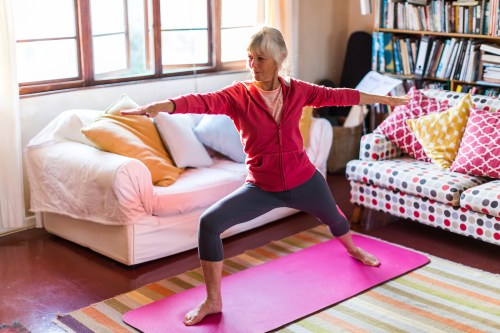Our editors independently select these products. Making a purchase through our links may earn Well+Good a commission
New Research Shows Regular Exercise Saves Nearly *4 Million* Lives Each Year
A new study found that regular exercise prevents 3.9 million early deaths globally each year. Here's how how exercise can help you live longer.

There’s a reason why getting regular exercise is at the top of every doctor’s list of things you should be doing to maximize your health. It’s good for your heart, helps stave off symptoms of depression, and strengthens your bones, among many other checkmarks in the “pro” column. One more—very convincing—reason to start moving more? According to new research, exercise can help you live longer, too.
A brand-new study published in Lancet from the Universities of Cambridge and Edinburgh found that regular physical activity prevented an average of 15 percent of deaths worldwide (14 percent for women and 16 percent for men), which means that exercise saved approximately 3.9 million lives globally each year. Yes—you read that right—3.9 million lives. Researchers looked at data from 168 countries on what proportion of the population was meeting the World Health Organization’s recommendations for exercise (at least 150 minutes of moderate-intensity aerobic activity throughout the week, 75 minutes of vigorous-intensity activity, or an equivalent combination). By combining the data with estimates of the relative risk of early death, they were able to estimate the proportion of premature deaths that were prevented because people are physically active.
While the news about exercise’s effectiveness in preventing early death may come as a surprise to many, it’s something that’s long been known by the world’s longest living people in the Blue Zones. Their lifestyles integrate “natural movement”—one of the “Power Nine” pillars of longevity—which is why it’s not uncommon for people in these parts of the world to celebrate their 100th birthdays.
While the idea of clocking 75 to 150 minutes of exercise per week may feel like a tall order for anyone with a jam-packed calendar, members of the Blue Zones prove exercise doesn’t have to be scheduled in half-hour increments that take place in the gym. According to pros, you can reap the same sorts of life-extending benefits by sprinkling your movement throughout the day by way of functional fitness. “Unfortunately, our modern lifestyles have been engineered in a way to take movement out of our lives, so it is up to us to get in as much as we can during the day,” The Longevity Plan author John Day, MD, previously told Well+Good. “For example, you could take a vow to never use an elevator or escalator again unless the stairs are restricted. Other options include an evening walk or doing everything possible to avoid having to use a car.”
By thinking about the life-extending impact exercise can have, Blue Zones-inspired “flexible fitness” encourages people to just get moving, whether that means an sweating through an hour-long spin class, treating yourself to a 10-minute exercise session, or simply taking a stroll around the block. Either way, all movement counts towards hitting your total weekly goal. “We’re used to looking at the downsides of not getting enough activity—whether that’s sports or a gym or just a brisk walk at lunchtime—but by focusing on the number of lives saved, we can tell a good news story of what is already being achieved,” says Tessa Strain, PhD, from the MRC Epidemiology Unit at the University of Cambridge, who authored the study. “It tells us how much good is being done and helps us say ‘look how much benefit physical activity is already providing—let’s make things even better by increasing physical activity levels further.”
Need some inspiration to start moving? Follow along with the video below:
Sign Up for Our Daily Newsletter
Get all the latest in wellness, trends, food, fitness, beauty, and more delivered right to your inbox.
Got it, you've been added to our email list.










